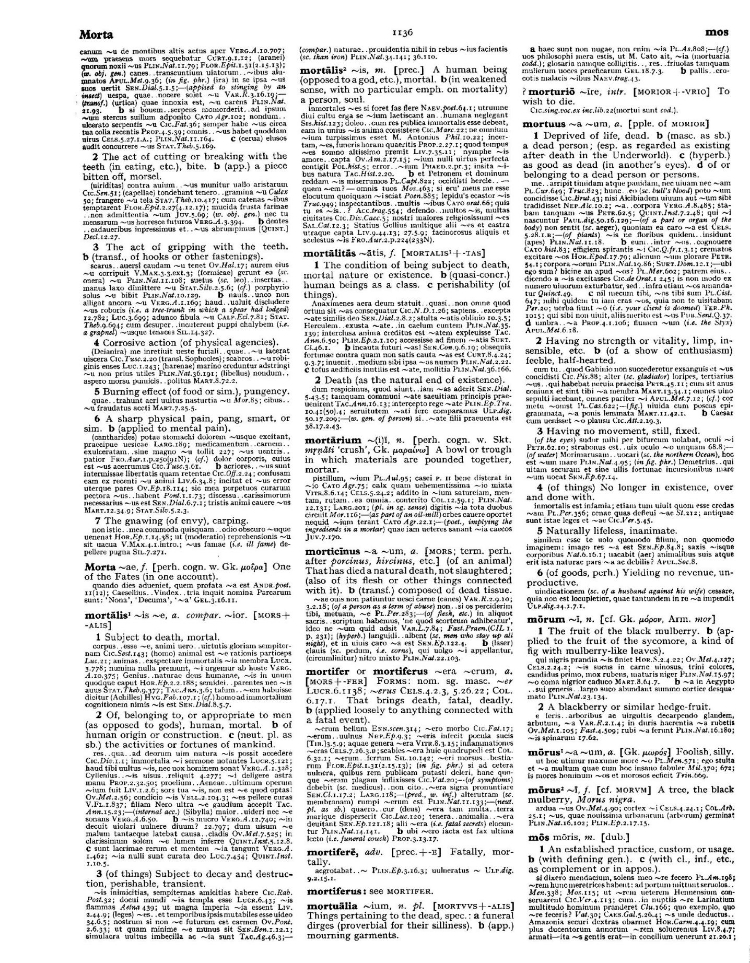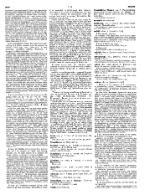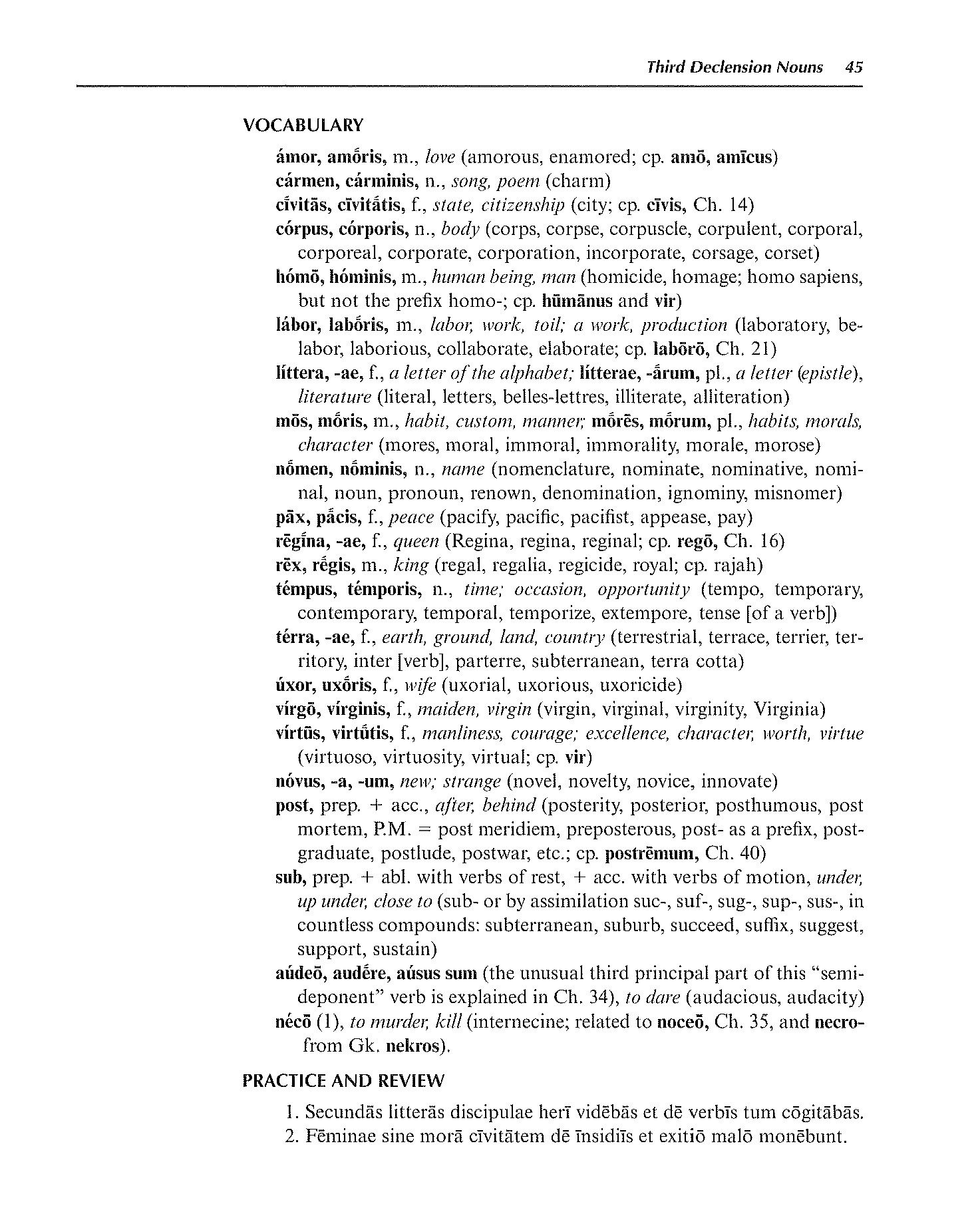
page_listing.tpl
page_subListingDetails.tpl
sub_listingDetails_style1.tpl
sub_listingDetails.title.tpl
mōs custom
mōs is a Latin Noun that primarily means custom.
Definitions for mōs
Wheelock's Latin
Noun
- 1
habit, custom, manner
- 2
mōrēs, mōrum, pl., habits, morals, character
English derivatives:
mores moral immoral immorality morale morose
Oxford Latin Dictionary
Noun
- 1
An established practice, custom, or usage. (b) (with defining gen.). (c) (with cl., inf., etc., as complement or in appos.).
- 2
(in generalized sense) The practices prevailing in a place, custom (esp. as a guide to action, often opp. law); (also pl.). (b) inherited custom, tradition. (c) (pregn.) civilized customs.
- 3
(a) In the customary or traditional way. (b) to be usual or customary. (c) in defiance of convention or civilized behaviour, lawlessly, etc.; (transf.) without system, wildly. (d) more than usual.
Sentences with mōs
Latin to English
Mōrēs hominis bonī erunt bonī.Compare The character of a good man will be good.
Rōmānī mōrēs temporum antīquōrum laudābant.Compare The Romans used to praise the customs of ancient times.
Hic frater geminus sum, homo inter sui quum forma tum mos similis, municeps autem suus dissimilis.Compare They were twin brothers, men like each other in character as well as in person, but most unlike their fellow-townsmen.
Casa mos Gallicus stramentum tego.Compare The huts had been covered with thatch after the manner of the Gauls.
Is de mos liber fortasse sum Aristoteles.Compare His books on morals are perhaps by Aristotle.
Declension table for mōs
Cactus2000
| Singular | Plural | |
| Nom. | mōs | mōrēs |
| Gen. | mōris | mōrum |
| Dat. | mōrī | mōribus |
| Acc. | mōrem | mōrēs |
| Abl. | mōre | mōribus |
Data sources
Notes
- Definitions
- Frederick M. Wheelock, Wheelock's Latin, 6th ed., rev. Richard A. LaFleur (New York, NY: HarperCollins Publishers, 2005): 45.
- P. G. W. Glare, Oxford Latin Dictionary, Vols. 1-8 (Oxford: Clarendon Press, 1982): 1136.
- Word frequencies
- Christopher Francese, "Latin Core Vocabulary," Dickinson College Commentaries, last modified 2014, http://dcc.dickinson.edu.
- Paul B. Diederich, The Frequency of Latin Words and Their Endings, PhD diss., (Columbia University, 1939).
- Louis Delatte, Suzanne Govaerts, Joseph Denooz, and Etienne Evrard, Dictionnaire fréquentiel et index inverse de la langue latine [Frequency Dictionary and Inverse Index of the Latin Language] (Liège, Belgium: Laboratoire d'analyse statistique des langues anciennes de l'Université de Liège [L.A.S.L.A.], 1981): 120.
Bibliography
Allen, Joseph H. Allen and Greenough's New Latin Grammar for Schools and Colleges: Founded on Comparative Grammar. Edited by James B. Greenough, George L. Kittredge, Albert A. Howard, and Benjamin L. D'Ooge. Boston, MA: Ginn & Company, 1903.
Crystal, David. A Dictionary of Linguistics and Phonetics. 6th ed. Oxford, UK: Blackwell Publishing, 2008.
Delatte, Louis, Suzanne Govaerts, Joseph Denooz, and Etienne Evrard. Dictionnaire fréquentiel et index inverse de la langue latine [Frequency Dictionary and Inverse Index of the Latin Language]. Liège, Belgium: Laboratoire d'analyse statistique des langues anciennes de l'Université de Liège (L.A.S.L.A.), 1981.
Diederich, Paul B. The Frequency of Latin Words and Their Endings. PhD diss., Columbia University, 1939.
Francese, Christopher. "Latin Core Vocabulary." Dickinson College Commentaries. Last modified 2014. http://dcc.dickinson.edu/latin-vocabulary-list.
Gildersleeve, Basil L., and Gonzales Lodge. Gildersleeve's Latin Grammar: Third Edition, Revised, and Enlarged. 3rd ed. London, England: Macmillan and Co., 1903.
Glare, Peter G.W. Oxford Latin Dictionary. Vols. 1-8. Oxford, England: Clarendon Press, 1982.
Krüger, Bernd. "Latin Conjugation Tables." Cactus2000. Accessed May 5, 2023. https://latin.cactus2000.de/index.en.php.
Pierson, Nick. "Sound of Text." Accessed October 26, 2019. https://soundoftext.com.
Wheelock, Frederick M. Wheelock's Latin. 6th ed. Revised by Richard A. LaFleur. New York, NY: HarperCollins Publishers, 2005.
Wiktionary Contributors. "Victionarium." Wikimedia Foundation, Inc. Updated March 18, 2019. https://la.wiktionary.org/wiki/Victionarium:Pagina_prima.
Citation
Chicago (17th ed.)
Allo Contributors. "mōs, mōris (n.) - Latin Word Definition." Allo Latin Dictionary. Last modified . Accessed February 19, 2026. http://ancientlanguages.org/latin/dictionary/mos-moris.
Entry created on . Last updated on .








